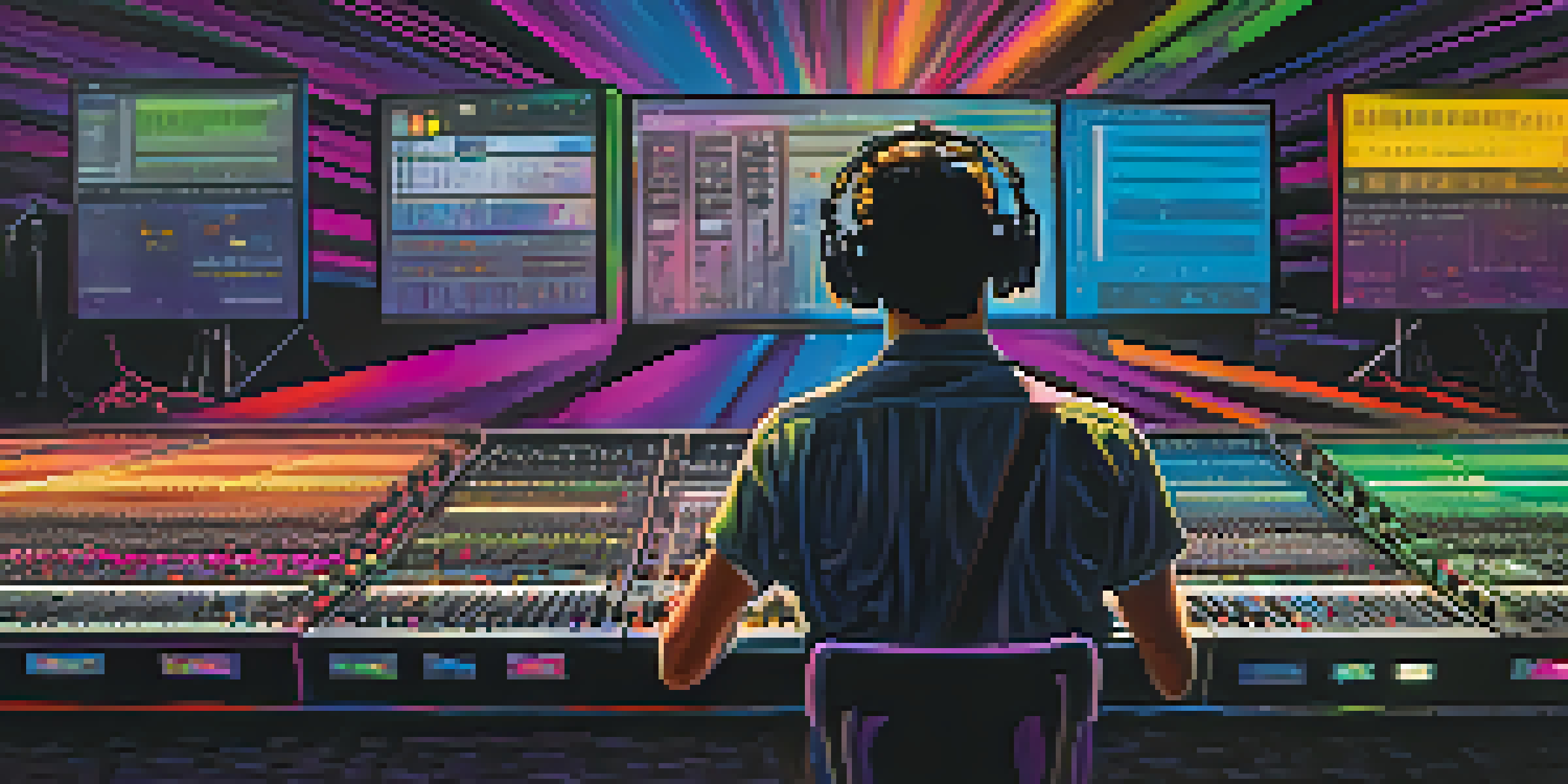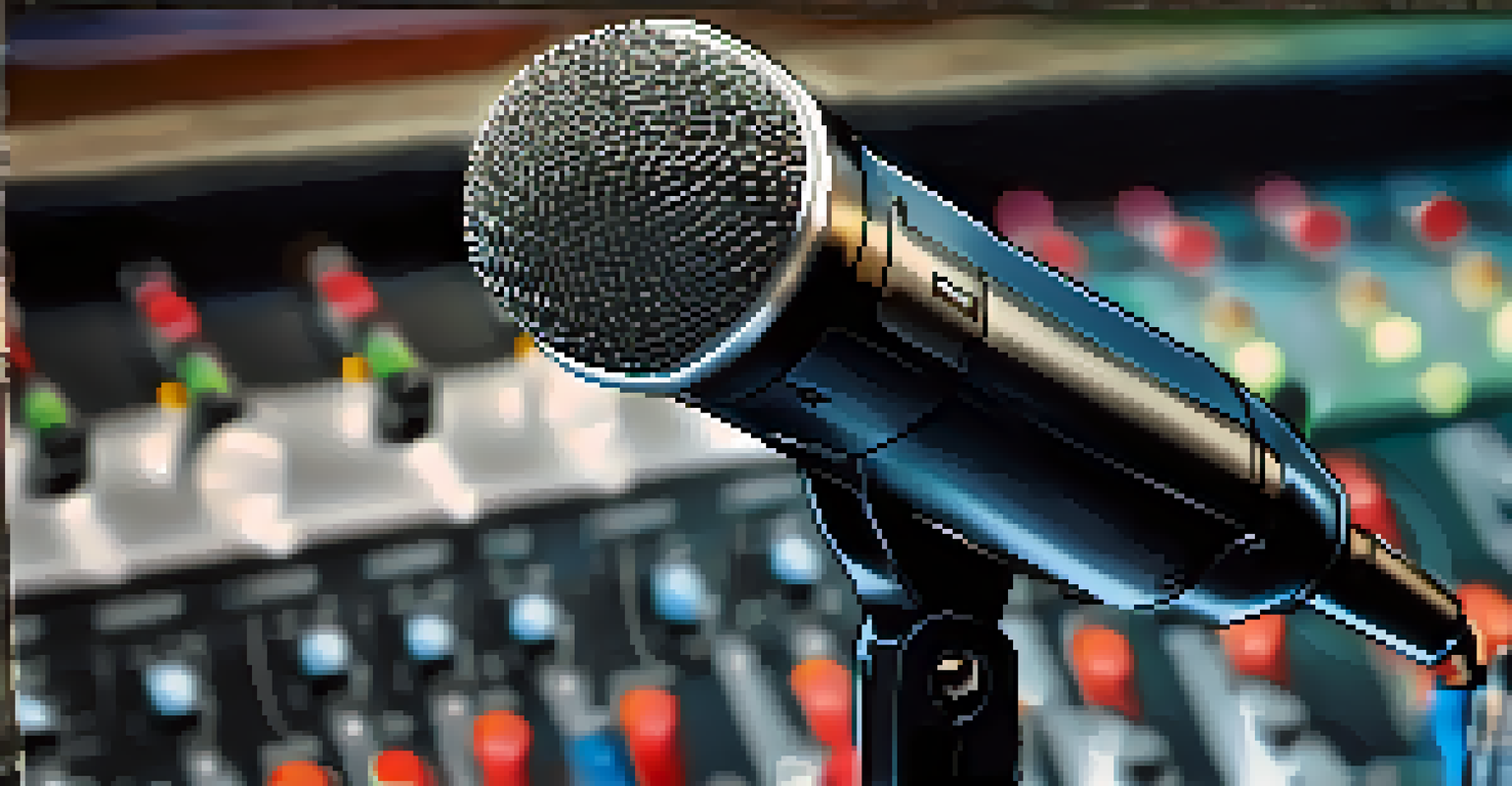Live Sound Engineering: Techniques for Successful Events

Understanding the Role of a Live Sound Engineer
At the heart of any successful event lies the expertise of a live sound engineer. This professional is responsible for managing sound quality, ensuring that every note and word is crystal clear. Think of them as the conductor of an orchestra, where each instrument must harmonize perfectly to create a beautiful symphony.
Good sound systems are like good relationships; they require care, attention, and the ability to adapt when things go wrong.
Their role doesn’t just stop at setting up equipment; it involves real-time adjustments during performances to adapt to different acoustics and audience responses. They work closely with artists and event coordinators, understanding the vision for the sound and the atmosphere they wish to create. This collaborative approach ensures that the sound enhances the overall experience rather than detracts from it.
In essence, a live sound engineer is the unsung hero of events, working behind the scenes to ensure that sound is not just heard but felt. Their ability to troubleshoot and adapt on the fly is what makes them indispensable in any live setting.
Essential Equipment for Live Sound Engineering
Having the right equipment is crucial for live sound engineering. This includes microphones, mixers, amplifiers, and speakers, each playing a vital role in delivering high-quality sound. For instance, dynamic microphones are great for loud environments, while condenser microphones excel in quieter settings, capturing subtle nuances in vocals.

Mixers serve as the control center, allowing engineers to adjust levels, apply effects, and blend different audio sources seamlessly. The sound engineer's choice of speakers is just as important; they must be powerful enough to fill the venue without distortion, ensuring every audience member enjoys the same sound quality.
Role of Live Sound Engineers
Live sound engineers are essential for creating high-quality audio experiences at events through collaboration and real-time adjustments.
Investing in quality gear not only enhances the performance but also builds the engineer's reputation. Well-chosen equipment can make a significant difference in sound clarity and overall event experience, setting the stage for memorable moments.
Setting Up the Sound System for Success
Proper setup of the sound system is like laying a strong foundation for a house; it’s essential for a successful event. This process involves strategic placement of speakers to optimize sound distribution and avoid feedback loops. For example, placing speakers too close to microphones can create unwanted echoes, detracting from the performance.
Sound is the vocabulary of nature; it’s our job to translate it into something beautiful.
Another important aspect is ensuring all cables are neatly organized and tested before the event begins. Loose or damaged cables can lead to technical glitches, causing unnecessary stress during live performances. A sound engineer's attention to detail in setup can significantly impact the smoothness of the event.
Additionally, conducting sound checks prior to the event allows the engineer to fine-tune levels and address any issues. This practice not only boosts confidence among performers but also reassures the audience that they’re in for a high-quality experience.
Mastering Live Mixing Techniques
Live mixing is an art that requires skill, intuition, and a deep understanding of sound dynamics. It’s about balancing various audio elements—vocals, instruments, and effects—to create a cohesive sound. Think of it as preparing a gourmet dish where each ingredient must complement the others perfectly.
One key technique is dynamic mixing, where the engineer adjusts levels in real-time based on the performance's energy. This means knowing when to bring up the vocals during a solo or lower the drums during a quieter passage, ensuring the audience remains engaged throughout the event.
Importance of Equipment
The right sound equipment, including microphones and mixers, significantly enhances audio clarity and the overall event experience.
Furthermore, using effects such as reverb and delay can add depth and space to the sound. However, moderation is crucial; too much processing can muddy the clarity, making it harder for the audience to connect with the performance.
Adapting to Different Venues and Audiences
Every venue presents its own unique acoustics and challenges, making adaptability a key trait for sound engineers. For example, a small club will have different sound requirements compared to a large outdoor festival. Understanding these differences allows engineers to tailor their approach and ensure optimal sound quality in any setting.
Moreover, reading the audience's reaction is vital; their energy can influence how sound is mixed live. If the crowd is enthusiastic, the engineer might boost the energy in the mix to match that excitement. Conversely, a more subdued audience may require a softer touch, ensuring they remain engaged without feeling overwhelmed.
Ultimately, being flexible and responsive to both the environment and the audience enhances the overall event experience. A successful sound engineer can turn challenges into opportunities, delivering a memorable sound experience regardless of the circumstances.
Troubleshooting Common Sound Issues
Even the most experienced sound engineers encounter unexpected challenges during live events. Common issues can include feedback, uneven sound distribution, or equipment malfunction. Being prepared to troubleshoot on the fly is essential; it's akin to being a firefighter, ready to extinguish problems before they escalate.
Feedback, for instance, can often be resolved by adjusting microphone placement or lowering the gain on the mixer. Engineers must remain calm under pressure, quickly identifying the source of the problem and implementing effective solutions. This not only salvages the performance but also maintains the audience's enjoyment.
Need for Continuous Learning
Continuous learning and adaptation to new technologies are crucial for sound engineers to remain effective and deliver memorable performances.
Having a backup plan and spare equipment on hand can also alleviate stress during an event. Whether it's an extra microphone or a backup amplifier, being prepared can save the day and keep the show running smoothly.
The Importance of Continuous Learning in Sound Engineering
The world of live sound engineering is constantly evolving, with new technologies and techniques emerging regularly. Continuous learning is essential for engineers to stay ahead of the curve and deliver the best possible experience. This could mean attending workshops, exploring new software, or simply experimenting with different mixing techniques.
Networking with other professionals in the industry can also provide valuable insights and inspiration. Sharing experiences and knowledge fosters a sense of community among sound engineers, contributing to collective growth and improvement. It’s like joining a sports team where everyone pushes each other to excel.

Ultimately, a commitment to learning not only enhances an engineer's skill set but also enriches the events they work on. By embracing new ideas and technologies, sound engineers can continue to create unforgettable experiences for audiences.